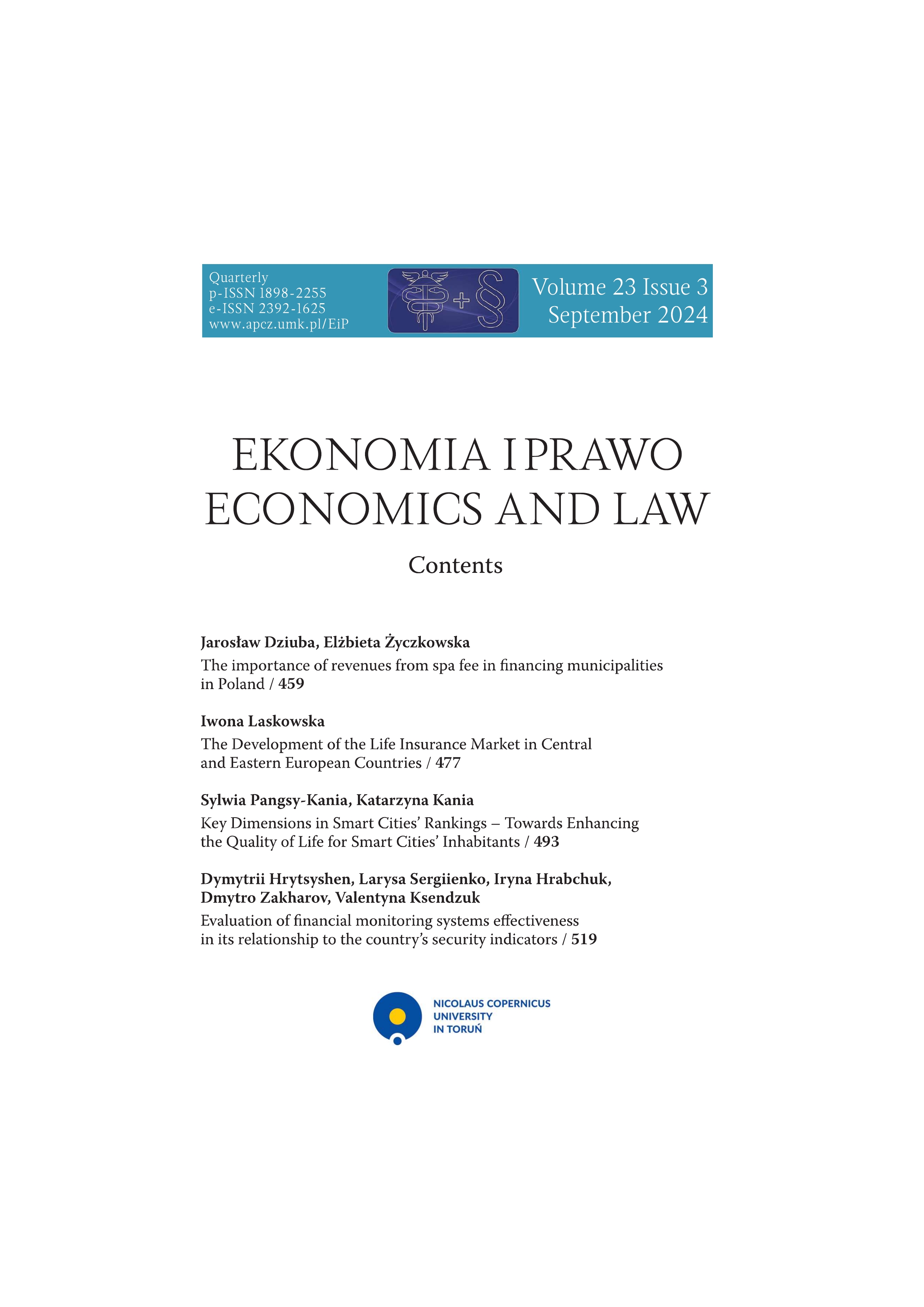The importance of revenues from spa fee in financing municipalities in Poland
DOI:
https://doi.org/10.12775/EiP.2024.023Keywords
local self-government, local finance, public revenues, public fee, spa feeAbstract
Motivation: The subject of interest presented in this study is the problem of spa fee and the resulting municipal revenues. In accordance with the international and constitutional standard of financial adequacy, including this fee in the revenue catalogue of only some municipalities should result from their specificity, i.e. generating additional budgetary expenditure not incurred by other municipalities.
Aim: The purpose of this paper is to address the systemic differences of spa municipalities, and primarily the additional tasks imposed on them, as well as to analyse and assess the importance of spa fee in the financial management of municipalities. Based on the analysis of this fee legal structure, and in particular its subject, an attempt was made to indicate the factors influencing its fiscal efficiency and significance.
Results: The fiscal efficiency of the discussed fee, as compared to other revenue categories, and its importance in the municipal financing structure are small (approx. 0.028% of the total municipal revenues and 1.41% of the total revenues generated by spa municipalities). The main factor influencing the amount of revenues from the fee and its share in the revenue structure is related to tourist activity in the municipality, mainly referring to a therapeutic treatment of natural persons. In the municipalities characterized by high tourist traffic, which results in an extensive accommodation offer corresponding to the demand, the importance of the fee in terms of financing is at a significant level, reaching even 6.8% of total revenues in the entire analysed period, i.e. 2017-2021 and over 8.8% in 2017. The occurrence of such cases is an argument proving the significant revenue potential of the fee. Increasing its use, in addition to developing both therapeutic and accommodation infrastructure in a municipality also requires taking action aimed at ensuring better efficiency of the spa fee collection.
References
Budzeń, D., & Kańduła, S. (2021). Opłaty lokalne. Niewykorzystane źródło dochodów gmin wiejskich w Polsce? Studia BAS, 1 (65), 203–227. doi:10.31268/studiabas.2021.11
Council of Europe. (1985). European charter of local self-government. Retrieved 20.11.2022 from https://www.coe.int.
Czarnecki, S. (2017). Opłaty uzdrowiskowa i miejscowa - podobieństwa i różnice. Zeszyty Naukowe WSEI Seria Ekonomia, 1-2 (13-14).
Dowgier, R. (2010). Wybrane problemy związane ze stosowaniem przepisów dotyczących opłaty miejscowej i uzdrowiskowej. In G. Liszewski (ed.), Opłaty samorządowe w Polsce - problemy praktyczne. Białystok: Wydawnictwo Temida 2.
Etel, L., Dowgier, R., Pahl, B., & Liszewski, G. (2020). Podatki i opłaty lokalne. Komen-tarz. Warszawa: Wolters Kluwer Polska.
Filipiak, B. Z. (2014). Adekwatność źródeł finansowania jednostek samorządu teryto-rialnego, Finanse Komunalne, 1-2.
Gomułowicz, A., & Małecki, J. (2013). Podatki i prawo podatkowe. Warszawa: Lex-isNexis.
Kłosowiak, M. (2020). Znaczenie zasady adekwatności dla funkcjonowania jednostek samorządu terytorialnego. Studia Iuridica, 85. doi: 10.31338/2544-3135.si.2020-85.19
Konstytucja Rzeczypospolitej Polskiej z dnia 2 kwietnia 1997 r. [Constitution of the Republic of Poland of April 2, 1997] (Dz.U. 1997 vol. 78, item 483) (Poland).
Kornberger-Sokołowska, E. (2013). Zasada adekwatności w systemie finansów samo-rządu terytorialnego w Polsce. Warszawa: LexisNexis.
Krajowa Rada Regionalnych Izb Obrachunkowych, (2021). Sprawozdanie z działalności regionalnych izb obrachunkowych i wykonania budżetu przez jednostki samorządu terytorialnego w 2020 r. Warszawa.
Kwaśniewski, R., & Majewska, I. (2017). Opłata miejscowa i uzdrowiskowa na przykładzie gmin województwa kujawsko-pomorskiego. Prawo Budżetowe Państwa I Samorządu, 4(4), 97–120. doi: 10.12775/PBPS.2016.025.
Malinowska-Misiąg, E ., & Misiąg, W. (2006). Finanse publiczne w Polsce. Warszawa LexisNexis.
Michalak-Trybus, B. (2019). Opłata i dotacja uzdrowiskowa – ewolucja unormowań prawnych. Studia Prawa Publicznego, 2 (26), 137–158. doi: 10.14746/spp.2019.2.26.6.
Miemiec, W. (1997). Europejska Karta Samorządu Terytorialnego jako zespół gwarancji zabezpieczających samodzielność finansową gmin – wybrane zagadnienia teoretycznoprawne, Samorząd Terytorialny, 10.
Ministry of Finance (2018-2022). Sprawozdania z wykonania budżetów gmin za lata 2017-2021. Retrieved on: 20.11.2022 from https://www.gov.pl/web/finanse/budzety-jst.
Najwyższa Izba Kontroli. (2016). Spełnianie wymogów określonych dla uzdrowisk. Retrieved on: 20.11.2022 from https://www.nik.gov.pl/aktualnosci/nik-o-statusie-uzdrowisk.html.
Ofiarska, E. (ed). (2015). Europejska Karta Samorządu Lokalnego a prawo samorządu terytorialnego. Szczecin: Uniwersytet Szczeciński.
Ostasiewicz, S., Rusnak, Z., & Siedlecka, U. (1999). Statystyka: elementy teorii i zadania. Wrocław: Akademia Ekonomiczna.
Owsiak, S. (2017), Finanse publiczne. Współczesne ujęcie. Warszawa: Wydawnictwo naukowe PWN.
Statistics Poland: Local Data Bank. (2022). Retrieved 20.11.2022 from https://bdl.stat.gov.pl/BDL.
Święch-Kujawska, K. (2016). Opłata uzdrowiskowa. In E. Koniuszewska (ed.), Szczególny status gminy uzdrowiskowej - z perspektywy 10 lat obowiązywania ustawy o lecznictwie uzdrowiskowym, uzdrowiskach i obszarach ochrony uzdrowiskowej oraz o gminach uzdrowiskowych. Szczecin: Uniwersytet Szczeciński.
Ustawa z dnia 8 marca 1990 r. o samorządzie gminnym [Act of March 8, 1990 on Municipal Self-Government] (Dz. U. 2023 r. item 40) (Poland).
Ustawa z dnia 12 stycznia 1991 r. o podatkach i opłatach lokalnych [Act of January 12, 1991 on local taxes and fees] (Dz.U. 2023 item 70) (Poland).
Ustawa z dnia 29 sierpnia 1997 r. Ordynacja podatkowa [Tax ordinance of Au-gust 29, 1997] (Dz.U. 2022 item 2651) (Poland).
Ustawa z dnia 28 lipca 2005 r. o lecznictwie uzdrowiskowym, uzdrowiskach i obszarach ochrony uzdrowiskowej oraz gminach uzdrowiskowych [Act of July 28, 2005 on spa treatment, spa resorts and spa protection areas and also spa municipalities] (Dz. U. 2023 r. item 151) (Poland).
Wantoch-Rekowski, J. (2016). Opłata uzdrowiskowa a pobyt w szpitalu uzdrowiskowym - uwagi na tle interpretacji ogólnej ministra finansów. Prawo Budżetowe Państwa i Samorządu. 1 (4). doi: 10.12775/PBPS.2016.002.
Wójtowicz, K. (2015). Przejawy naruszeń zasady adekwatności w procesie decentralizacji zadań publicznych w Polsce. Prace Naukowe Uniwersytetu Ekonomicznego we Wrocławiu, 391. doi: 10.15611/pn.2015.391.30
Wołowiec, T., & Stefański, M. (2018). Opłata uzdrowiskowa i miejscowa a zasady inkasa oraz istota ewidencji księgowej z perspektywy inkasentów. Zeszyty Naukowe WSEI Seria Ekonomia, 1-2.
Wołowiec, T., Reśko, D., & Soboń, J. (2016). Opłata miejscowa i uzdrowiskowa jako daniny „samorządowe”. Zeszyty Naukowe WSEI Seria Administracja. 1 (6).
Wyszkowska, J. (2014). Zastosowanie zasady adekwatności dochodów do zadań jednostek samorządu terytorialnego. Samorząd Terytorialny, 10.
Downloads
Published
How to Cite
Issue
Section
License
Copyright (c) 2024 Jarosław Dziuba, Elżbieta Życzkowska

This work is licensed under a Creative Commons Attribution-NoDerivatives 4.0 International License.
Stats
Number of views and downloads: 606
Number of citations: 0
